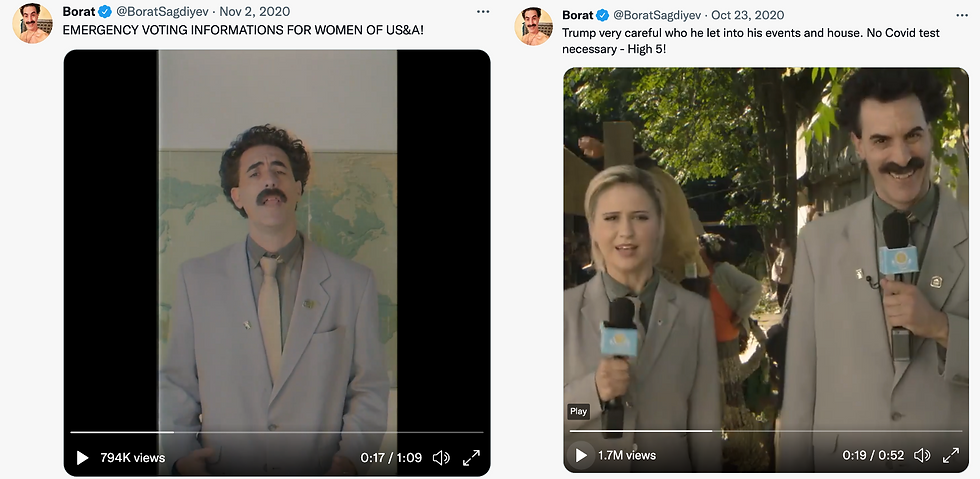Eco villains: change or die!
- Vera Mark

- Oct 27, 2021
- 3 min read
Or, possibly worse, be humiliated.
Moving on from the ‘Green Hero’ post last week, let’s turn to the villains. Hands up: who doesn’t secretly (or openly) prefer a juicy baddie over any goody-two-shoes hero? But hang on, I want Ecotopia stories to promote positive action… Well, it’s complex. Just like climate issues. And there lies not only the rub, but also tons of potential.
Take ‘em out!
Let’s start with the black-and-white version. The Voldemorts of environmental crimes. Take him (or her) out. Erm… out? Or ‘just’ out of the picture?
This brings up the issue of violence. While I love me a good action movie or crime novel, I don’t want to suggest we should write the killing of a Fossil Fuel Executive as our protagonist’s goal. Actually, I am struggling with this question in a current short story: how far is my protagonist willing to go to save the planet? Civil disobedience, sure. Brandalism, why not. Blowing up a tar sands pipeline, well, as long as no one gets hurt…?
Eco heroes should serve as positive role models, but I do want to see and read stories where the eco villain pays a real price. Personal, not just corporate - pipelines are probably well insured. And preferably, the result is a genuine change of heart. Send them to jail, then reunite them with their loved ones years later to find their kids have turned the oil company into a wind farm - and they realise that this is the better way.

Alternatively: ridicule them
As Borat, Sacha Baron Cohen uses exposure and humiliation to show how ridiculous and wrong the behaviour and thinking of his ‘opponents’ is. I would not normally propose to ridicule or humiliate anyone. But when it comes to those who perpetuate the climate emergency for their short-term profit and destroy our children’s future, I say go for it!

(Thanks to my fellow screenwriter Alexis Howell-Jones for the ‘ridicule suggestion’!)
Also, this is still more ethical - and, if you’re making a film, cheaper - than having your heroes kill the villains in an action-packed showdown.
This probably works particularly well in comedy and satire - although strictly speaking, in satire the exposed character does not learn, so it’s not entirely useful for Ecotopian purposes - but play around with this idea for drama as well. Show how a humiliated, disgraced eco villain hurts just as much as the grandmother who has lost her family to floods made worse by the villain’s building project - and perhaps then have them find common ground, redemption for the villain and respect and relief for the victim.
It's … complicated
So, we can take clear-cut evil eco gangsters out (of the picture) or humiliate them. But what do we do with the ‘righteous antagonists’? The villains who believe they are doing the right thing, or whose motivation (grief, loss, revenge) we can understand at some level or other? Think of Marvel and the Avengers what you will, but Thanos is a really interesting bad guy.

He snaps his fingers, and half the living beings in the universe die. He kills, he destroys, he brings about colossal grief. But why? Basically because he thinks the universe can only sustain half the inhabitants, i.e. can only survive with less people in it. (And I seem to recall that his own deep grief plays into it somehow.) As an abstract thought, that has some merit, right? Only the solution shouldn’t be mass murder…
But anyway, a villain like this is much more real and human - and more likely to lurk in the real world. Consequently, showing someone like this either get punished, or rewarded when s/he changes, carries a message that may be more appropriate for the messy, complicated real-life situations most of us find ourselves in.
Any thoughts on creating eco villains and on how to use them to sway an audience’s mind and behaviour? Have you done any of that in your own writing? Leave a comment, do share ideas!
Next up: Make green behaviour part of your storytelling DNA.



Never with an eco-villain, but with a able-ist exploiter - I simply let him be completely humiliated by a bitter yet creative victim. Proud of it. Wish I had known him myself. Reminds me of a conversation I had just yesterday with a political activist abroad: if you find yourself in a situation where an organisation or informal structural alliance is using bullying tactics, find the biggest bully and punch him in the nose. Twice. Hard. He was speaking figuratively, although interestingly we had both deployed the exact same technique as schoolboys to defend intellectually disabled people from bullying - and in that case, we did it literally. Just one of many things that we had in common. Anyway, I'm waffling,…